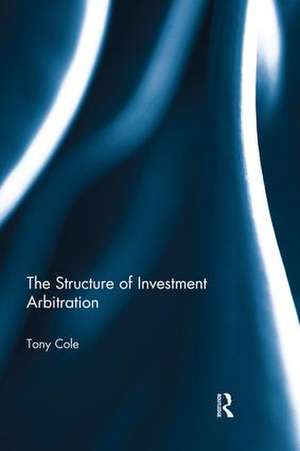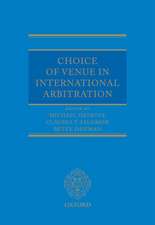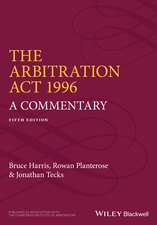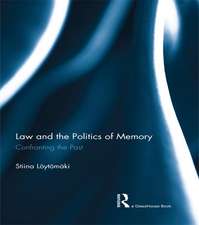The Structure of Investment Arbitration
Autor Tony Coleen Limba Engleză Paperback – 9 iun 2015
| Toate formatele și edițiile | Preț | Express |
|---|---|---|
| Paperback (1) | 408.74 lei 43-57 zile | |
| Taylor & Francis – 9 iun 2015 | 408.74 lei 43-57 zile | |
| Hardback (1) | 1057.05 lei 43-57 zile | |
| Taylor & Francis – 27 iun 2013 | 1057.05 lei 43-57 zile |
Preț: 408.74 lei
Nou
Puncte Express: 613
Preț estimativ în valută:
78.24€ • 85.01$ • 65.76£
78.24€ • 85.01$ • 65.76£
Carte tipărită la comandă
Livrare economică 21 aprilie-05 mai
Preluare comenzi: 021 569.72.76
Specificații
ISBN-13: 9781138930063
ISBN-10: 1138930067
Pagini: 192
Dimensiuni: 156 x 234 x 23 mm
Greutate: 0.28 kg
Ediția:1
Editura: Taylor & Francis
Colecția Routledge
Locul publicării:Oxford, United Kingdom
ISBN-10: 1138930067
Pagini: 192
Dimensiuni: 156 x 234 x 23 mm
Greutate: 0.28 kg
Ediția:1
Editura: Taylor & Francis
Colecția Routledge
Locul publicării:Oxford, United Kingdom
Public țintă
Postgraduate and UndergraduateCuprins
Introduction: The Structural Analysis of International Investment Law 1. The Meaning of 'Investment' in the ICSID Convention 2. The Legal Impact of Notifications Under Article 25(4) of the ICSID Convention 3. The Role of an Investment Arbitrator and the Use of Non-Binding Documents and Literature in Investment Arbitration 4. The Minimum Standard of Treatment and the Protection of Investors During an Armed Conflict 5. The History and Development of the Most-Favoured Nation Clause 6. The Operation of the Most-Favoured Nation Clause in International Investment Law 7. Dispute Resolution Procedures and the Favourability of Treatment Under a Most-Favoured Nation Clause
Descriere
Although a State’s treatment of foreign investors has long been regulated by international law, it is only recently that international investment law has emerged as an independent discipline in its own right. In recent decades the practical success of investment arbitration has allowed international investment law to develop both its own cadre of academic and professional specialists and its own legal doctrines. This book analyses the structure of international investment law, as it has developed through the practice of investment arbitration in order to see how a variety of international investment law doctrines should be understood and applied. The book demonstrates how a structural analysis can shed light on several major controversies within investment law and also examines what an "investment" actually is. The book offers an original interpretative approach to the resolution of problems in international investment law, and so is one of the few books within the field to attempt to give investment law a solid theoretical basis. It also focuses on only a select number of problems, rather than attempting to deliver the universal coverage currently popular for investment law books. As a result, those issues that are addressed get a detailed discussion rarely available in competing texts.











